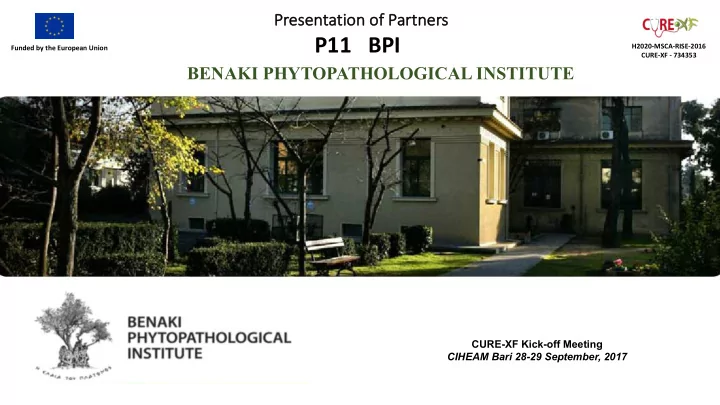

Pr Presentation of Pa Partners P11 BPI H2020-MSCA-RISE-2016 Funded by the European Union CURE-XF - 734353 BENAKI PHYTOPATHOLOGICAL INSTITUTE CURE-XF Kick-off Meeting CIHEAM Bari 28-29 September, 2017
BENAKI PHYTOPATHOLOGICAL INSTITUTE H2020-MSCA-RISE-2016 Funded by the European Union CURE-XF - 734353 location in Greece, in the city of Kifissia, about 15 km from the capital (Athens). short description § Benaki Phytopathological Institute (BPI) is a Legal Entity of the Public Sector ( Academic Sector ), donated by the National Benefactor Emmanouel Benakis. § Established in 1929. It was the first Greek research institute to have a broad scientific basis in plant health and plant protection. § It operates under the supervision of the Hellenic Ministry of Rural Development & Food. CURE-XF Kick-off Meeting CIHEAM Bari 28-29 September, 2017
Organization chart of BPI H2020-MSCA-RISE-2016 Funded by the European Union CURE-XF - 734353
H2020-MSCA-RISE-2016 Funded by the European Union CURE-XF - 734353 staff Laboratory of Bacteriology Current laboratory staff Scientific staff Maria C. Holeva , PhD, Plant Pathologist-Bacteriologist, • Associate Research Scientist, Head of the Laboratory Charikleia Karafla , Agronomist Technologist • Paraskevas E. Glynos , Agronomist Technologist • Eleftheria Siderea , Agronomist Technologist • Athanasios Togias , Agronomist Technologist • Technical assistant Spyridon P. Drakoulis •
Main activities in the Laboratory of Bacteriology at BPI H2020-MSCA-RISE-2016 Funded by the European Union CURE-XF - 734353 A. Diagnosis of diseases of agricultural crops caused by bacterial pathogens or phytoplasmas (application, development and comparative evaluation of diagnostic techniques) e.g. Laboratory phytosanitary control of imported/exported plant material - Laboratory assays for surveys-Ring tests B. Pathogen characterization (epidemiological and genetic characteristics) e.g. haplotype characterization, phylogenetic relationships C. Pathosystem studies e.g. pathogen’s virulence factors, plant genetic resources for resistance D. Disease control e.g. development of new means for the control of plant diseases (non-transgenic) or exploiting the antibacterial activity of plant extracts E. Pest Risk Analysis (PRA) on quarantine phytopathogenic bacteria F. Educational activities e.g. theoretical seminars and laboratory practical training for agronomists e.g. supervision of the practical stage and dissertations of students from Universities and Technological Educational Institutes
Main facilities and scientific equipment H2020-MSCA-RISE-2016 Funded by the European Union used by the Laboratory of Bacteriology CURE-XF - 734353 Laminar flow cabinets, incubators, water-bath devices Various refrigerated/non-refrigerated centrifuges Microscopes: epi-fluorescence microscope, phase contrast microscope Homogenizer for plant samples ELISA photometer PCR machines, real-time PCR machine, nano-spectrophotometer, gel-documentation system, agarose/polyacrylamide gel electrophoresis systems, cross-linker, automatic nucleic acid extraction machine, electroporator Deep freezers Glasshouse facilities and growth cabinet for plants (control system for light, temperature, humidity)
Main facilities in the Laboratory of Bacteriology H2020-MSCA-RISE-2016 Room for microbiological cultures Funded by the European Union CURE-XF - 734353 Lab space for sampling plant tissues Lab space for various biochemical tests and serological tests (IF, ELISA) Lab space for microscopy observation of specimens Nucleic acid extraction space (manual or automatic extraction) Glasshouse facilities to run PCR set up space (cabinet) pathogenicity tests Post PCR analysis space (agarose gels electrophoresis, gel documentation system) CURE-XF Kick-off Meeting CIHEAM Bari 28-29 September, 2017
H2020-MSCA-RISE-2016 Funded by the European Union CURE-XF - 734353 Accommodation metro bus From BPI to other participant Institutions 2 secondments (1 month/secondment) From other participant Institutions to BPI 6 secondments (1 month/secondment)
Main activities on Xylella fastidiosa H2020-MSCA-RISE-2016 Funded by the European Union CURE-XF - 734353 Projects-Research activities Ø EC and Hellenic Ministry of Rural Development and Food. ‘National survey program for the recognition and maintenance of protected zones against some organisms harmful to plants (“quarantine pests”)’ (2011-2017), Coordinator: BPI, www.bpi.gr/section. aspx?id=2&subid=233 Ø HORIZON 2020 ‘ Xylella Fastidiosa Active Containment Through a multidisciplinary-Oriented Research Strategy (XF-ACTORS)’ (2016-2020), Coordinator: Consiglio Nazionale delle Ricerche (CNR), Italy, www.xfactorsproject.eu/ Ø COST ΑCTION CA16107 ‘Integrating science on Xanthomonadaceae for integrated plant disease management in Europe (EuroXanth)’ (2017-2021), Coordinator: Institut de Recherche pour le Developpement Montpellier, France, https://euroxanth.eu/ Diagnostic checks on samples sent by Phytosanitary Inspectors & samples sent by agronomists, growers, industry, etc Xf not recorded in Greece, so live bacterial cultures are not used - work only with inactivated bacterial cells or DNA of Xf CURE-XF Kick-off Meeting CIHEAM Bari 28-29 September, 2017
H2020-MSCA-RISE-2016 Funded by the European Union CURE-XF - 734353 Thank you for your attention!
Recommend
More recommend